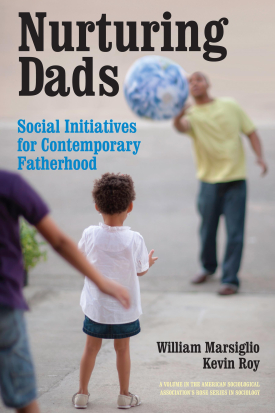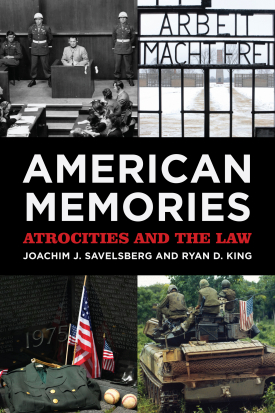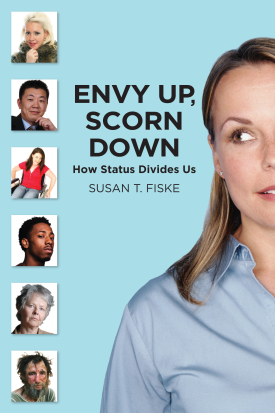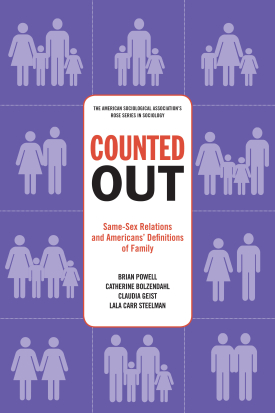
Nurturing Dads
About This Book
A Volume in the American Sociological Association’s Rose Series in Sociology
American fathers are a highly diverse group, but the breadwinning, live-in, biological dad prevails as the fatherhood ideal. Consequently, policymakers continue to emphasize marriage and residency over initiatives that might help foster healthy father-child relationships and creative co-parenting regardless of marital or residential status. In Nurturing Dads, William Marsiglio and Kevin Roy explore the ways new initiatives can address the social, cultural, and economic challenges men face in contemporary families and foster more meaningful engagement between many different kinds of fathers and their children.
What makes a good father? The firsthand accounts in Nurturing Dads show that the answer to this question varies widely and in ways that counter the mainstream "provide and reside" model of fatherhood. Marsiglio and Roy document the personal experiences of more than three hundred men from a wide range of socioeconomic backgrounds and diverse settings, including fathers-to-be, young adult fathers, middle-class dads, stepfathers, men with multiple children in separate families, and fathers in correctional facilities. They find that most dads express the desire to have strong, close relationships with their children and to develop the nurturing skills to maintain these bonds. But they also find that disadvantaged fathers, including young dads and those in constrained financial and personal circumstances, confront myriad structural obstacles, such as poverty, inadequate education, and poor job opportunities.
Nurturing Dads asserts that society should help fathers become more committed and attentive caregivers and that federal and state agencies, work sites, grassroots advocacy groups, and the media all have roles to play. Recent efforts to introduce state-initiated paternity leave should be coupled with social programs that encourage fathers to develop unconditional commitments to children, to co-parent with mothers, to establish partnerships with their children's other caregivers, and to develop parenting skills and resources before becoming fathers via activities like volunteering and mentoring kids. Ultimately, Marsiglio and Roy argue, such combined strategies would not only change the policy landscape to promote engaged fathering but also change the cultural landscape to view nurturance as a fundamental aspect of good fathering.
Care is a human experience—not just a woman's responsibility—and this core idea behind Nurturing Dads holds important implications for how society supports its families and defines manhood. The book promotes the progressive notion that fathers should provide more than financial support and, in the process, bring about a better start in life for their children.
WILLIAM MARSIGLIO is professor in the Department of Sociology and Criminology & Law at the University of Florida.
KEVIN ROY is associate professor of family science at the University of Maryland
Related Events & Media
RSF Journal
View Book Series
Sign Up For Our Mailing List
Apply For Funding

American Memories
About This Book
A Volume in the American Sociological Association’s Rose Series in Sociology
Winner of the 2012 Outstanding Book Award of the Theory Section of the Society for the Study of Social Problems (SSSP)
In the long history of warfare and cultural and ethnic violence, the twentieth century was exceptional for producing institutions charged with seeking accountability or redress for violent offenses and human rights abuses across the globe, often forcing nations to confront the consequences of past atrocities. The Holocaust ended with trials at Nuremberg, apartheid in South Africa concluded with the Truth and Reconciliation Commission, and the Gacaca courts continue to strive for closure in the wake of the Rwandan genocide. Despite this global trend toward accountability, American collective memory appears distinct in that it tends to glorify the nation’s past, celebrating triumphs while eliding darker episodes in its history. In American Memories, sociologists Joachim Savelsberg and Ryan King rigorously examine how the United States remembers its own and others’ atrocities and how institutional responses to such crimes, including trials and tribunals, may help shape memories and perhaps impede future violence.
American Memories uses historical and media accounts, court records, and survey research to examine a number of atrocities from the nation’s past, including the massacres of civilians by U.S. military in My Lai, Vietnam, and Haditha, Iraq. The book shows that when states initiate responses to such violence—via criminal trials, tribunals, or reconciliation hearings—they lay important groundwork for how such atrocities are viewed in the future. Trials can serve to delegitimize violence—even by a nation’s military— by creating a public record of grave offenses. But the law is filtered by and must also compete with other institutions, such as the media and historical texts, in shaping American memory. Savelsberg and King show, for example, how the My Lai slayings of women, children, and elderly men by U.S. soldiers have been largely eliminated from or misrepresented in American textbooks, and the army’s reputation survived the episode untarnished. The American media nevertheless evoked the killings at My Lai in response to the murder of twenty-four civilian Iraqis in Haditha, during the war in Iraq. Since only one conviction was obtained for the My Lai massacre, and convictions for the killings in Haditha seem increasingly unlikely, Savelsberg and King argue that Haditha in the near past is now bound inextricably to My Lai in the distant past. With virtually no criminal convictions, and none of higher ranks for either massacre, both events will continue to be misrepresented in American memory. In contrast, the book examines American representations of atrocities committed by foreign powers during the Balkan wars, which entailed the prosecution of ranking military and political leaders. The authors analyze news accounts of the war’s events and show how articles based on diplomatic sources initially cast Serbian President Slobodan Milosevic in a less negative light, but court-based accounts increasingly portrayed Milosevic as a criminal, solidifying his image for the public record.
American Memories provocatively suggests that a nation’s memories don’t just develop as a rejoinder to events—they are largely shaped by institutions. In the wake of atrocities, how a state responds has an enduring effect and provides a moral framework for whether and how we remember violent transgressions. Savelsberg and King deftly show that such responses can be instructive for how to deal with large-scale violence in the future, and hopefully how to deter it.
JOACHIM J. SAVELSBERG is professor of sociology at the University of Minnesota.
RYAN D. KING is associate professor of sociology at the University at Albany, State University of New York.
Related Events & Media
RSF Journal
View Book Series
Sign Up For Our Mailing List
Apply For Funding

Envy Up, Scorn Down
About This Book
An insightful examination of why we compare ourselves to those above and below us.
The United States was founded on the principle of equal opportunity for all, and this ethos continues to inform the nation’s collective identity. In reality, however, absolute equality is elusive. The gap between rich and poor has widened in recent decades, and the United States has the highest level of economic inequality of any developed country. Social class and other differences in status reverberate throughout American life, and prejudice based on another’s perceived status persists among individuals and groups. In Envy Up, Scorn Down, noted social psychologist Susan Fiske examines the psychological underpinnings of interpersonal and intergroup comparisons, exploring why we compare ourselves to those both above and below us and analyzing the social consequences of such comparisons in day-to-day life.
What motivates individuals, groups, and cultures to envy the status of some and scorn the status of others? Who experiences envy and scorn most? Envy Up, Scorn Down marshals a wealth of recent psychological studies as well as findings based on years of Fiske’s own research to address such questions. She shows that both envy and scorn have distinctive biological, emotional, cognitive, and behavioral characteristics. And though we are all “wired” for comparison, some individuals are more vulnerable to these motives than others. Dominant personalities, for example, express envy toward high-status groups such as the wealthy and well-educated, and insecurity can lead others to scorn those perceived to have lower status, such as women, minorities, or the disabled. Fiske shows that one’s race or ethnicity, gender, and education all correlate with perceived status. Regardless of whether one is accorded higher or lower status, however, all groups rank their members, and all societies rank the various groups within them. We rate each group as either friend or foe, able or unable, and accordingly assign them the traits of warmth or competence. The majority of groups in the United States are ranked either warm or competent but not both, with extreme exceptions: the homeless or the very poor are considered neither warm nor competent. Societies across the globe view older people as warm but incompetent. Conversely, the very rich are generally considered cold but highly competent. Envy Up, Scorn Down explores the nuances of status hierarchies and their consequences and shows that such prejudice in its most virulent form dehumanizes and can lead to devastating outcomes—from the scornful neglect of the homeless to the envious anger historically directed at Tutsis in Rwanda or Jews in Europe.
Individuals, groups, and even cultures will always make comparisons between and among themselves. Envy Up, Scorn Down is an accessible and insightful examination of drives we all share and the prejudice that can accompany comparison. The book deftly shows that understanding envy and scorn—and seeking to mitigate their effects—can prove invaluable to our lives, our relationships, and our society.
SUSAN T. FISKE is Eugene Higgins Professor of Psychology at Princeton University.
An interview with Fiske can be read here.
Related Events & Media
RSF Journal
View Book Series
Sign Up For Our Mailing List
Apply For Funding

Counted Out
About This Book
A Volume in the American Sociological Association’s Rose Series in Sociology
Winner of the 2011 William T. Goode Award from the Family Section of the American Sociological Association
Winner of the North Central Sociological Association’s 2011 Scholarly Achievement Award
Winner of the Midwest Sociological Society’s 2011 Distinguished Book Award
When state voters passed the California Marriage Protection Act (Proposition 8) in 2008, it restricted the definition of marriage to a legal union between a man and a woman. The act’s passage further agitated an already roiling national debate about whether American notions of family could or should expand to include, for example, same-sex marriage, unmarried cohabitation, and gay adoption. But how do Americans really define family? The first study to explore this largely overlooked question, Counted Out examines currents in public opinion to assess their policy implications and predict how Americans’ definitions of family may change in the future.
Counted Out broadens the scope of previous studies by moving beyond efforts to understand how Americans view their own families to examine the way Americans characterize the concept of family in general. The book reports on and analyzes the results of the authors’ Constructing the Family Surveys (2003 and 2006), which asked more than 1,500 people to explain their stances on a broad range of issues, including gay marriage and adoption, single parenthood, the influence of biological and social factors in child development, religious ideology, and the legal rights of unmarried partners. Not surprisingly, the authors find that the standard bearer for public conceptions of family continues to be a married, heterosexual couple with children. More than half of Americans also consider same-sex couples with children as family, and from 2003 to 2006 the percentages of those who believe so increased significantly—up 6 percent for lesbian couples and 5 percent for gay couples. The presence of children in any living arrangement meets with a notable degree of public approval. Less than 30 percent of Americans view heterosexual cohabitating couples without children as family, while similar couples with children count as family for nearly 80 percent. Counted Out shows that for most Americans, however, the boundaries around what they define as family are becoming more malleable with time.
Counted Out demonstrates that American definitions of family are becoming more expansive. Who counts as family has far-reaching implications for policy, including health insurance coverage, end-of-life decisions, estate rights, and child custody. Public opinion matters. As lawmakers consider the future of family policy, they will want to consider the evolution in American opinion represented in this groundbreaking book.
BRIAN POWELL is Rudy Professor of Sociology at Indiana University.
CATHERINE BOLZENDAHL is assistant professor of sociology in the School of Social Sciences at the University of California, Irvine.
CLAUDIA GEIST is assistant professor in the Department of Sociology at the University of Utah.
LALA CARR STEELMAN is professor in the Department of Sociology at the University of South Carolina.
Related Events & Media
RSF Journal
View Book Series
Sign Up For Our Mailing List
Apply For Funding
Pagination
- Previous page
- Page 21
- Next page
